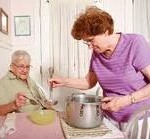
Most of us do not truly understand the financial side of caring for our aging loved ones until forced too. In a survey conducted of more than 18,000 long-term care nursing centers and in-home senior care providers, In-home senior care costs $16-$26 per hour, 24-hour live-in care costs $280-$552 per day, while nursing home care can cost $180-$400 a day.
Not only are nursing homes a long-term care option, but they often become places for rehabilitation after loved ones are discharged from hospitals. But it’s important to know that Medicare does not cover long-term care costs after 100 days. While Medicaid will cover most of those costs, it varies from state to state, and is contingent on a minimum annual income.
Here’s a breakdown of elder care costs in North Carolina, according to a 2011 MetLife Market Survey of Long-Term Care Costs:
• Average cost for a private nursing home room in North Carolina, in the Triangle area, is $242 per day, keeping in mind whether a short-term rehab stay, or long-term living option, Medicare does not cover the costs of nursing home long-term care after 100 days.
• Average cost for a home health aide is $19 per hour. If you assume five hours per day, three days per week, that’s $1,140 per month. In addition, there are still household expenses like rent or mortgage, utilities, property taxes and insurance, food, home association fees, home repair and maintenance fees, and social and entertainment expenses. Not to mention making home modifications should your parents be confined to wheelchairs.
• Average monthly cost of assisted living in North Carolina is $3,605 per month (fees cover basic living expenses including rent, utilities, meals, security, housekeeping and laundry, case management and monitoring, transportation, and entertainment and social activities.
Your Next Move can help you locate the perfect senior housing for your aging loved one. Our team of relocation specialists are also with you through every step of the transition process including home sale, downsizing, estate sales and moving household goods.
This blog post is brought to you by the team at Your Next Move. If you are interested in further information you may contact us below. LIKE us on Facebook and follow us on Twitter to get the most current communication on the subject of senior relocation. Please join our mailing list.
Your Next Move, Easing Your Senior Transition
Julie Kopetsky, President
www.yournextmovenc.com
919-601-8203
Julie.kopetsky@yournextmovenc.com




